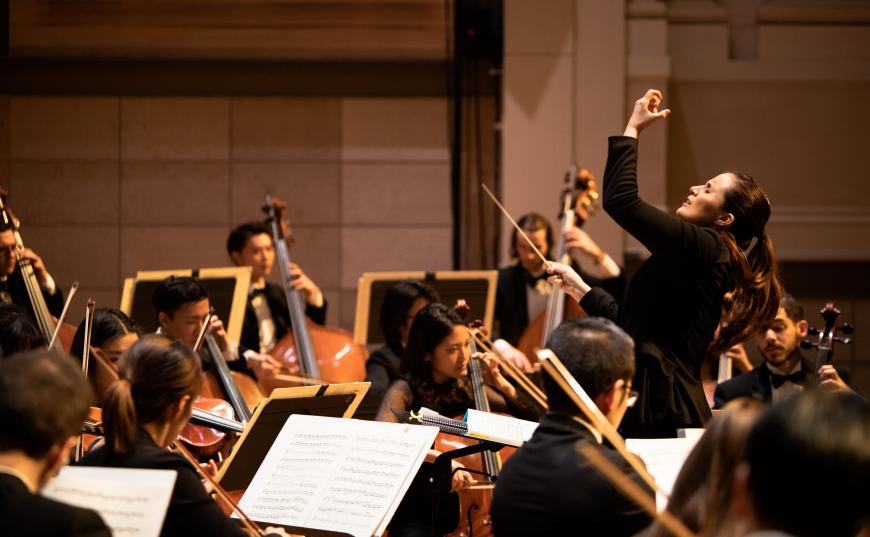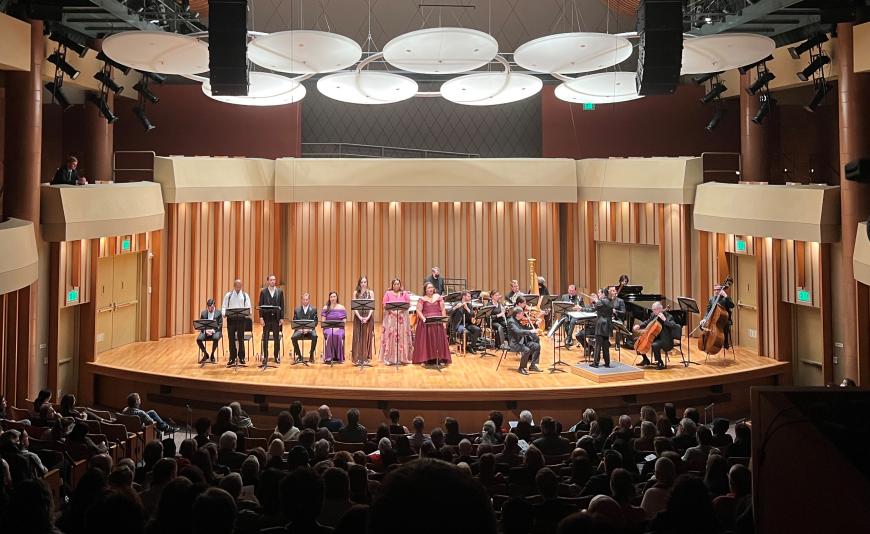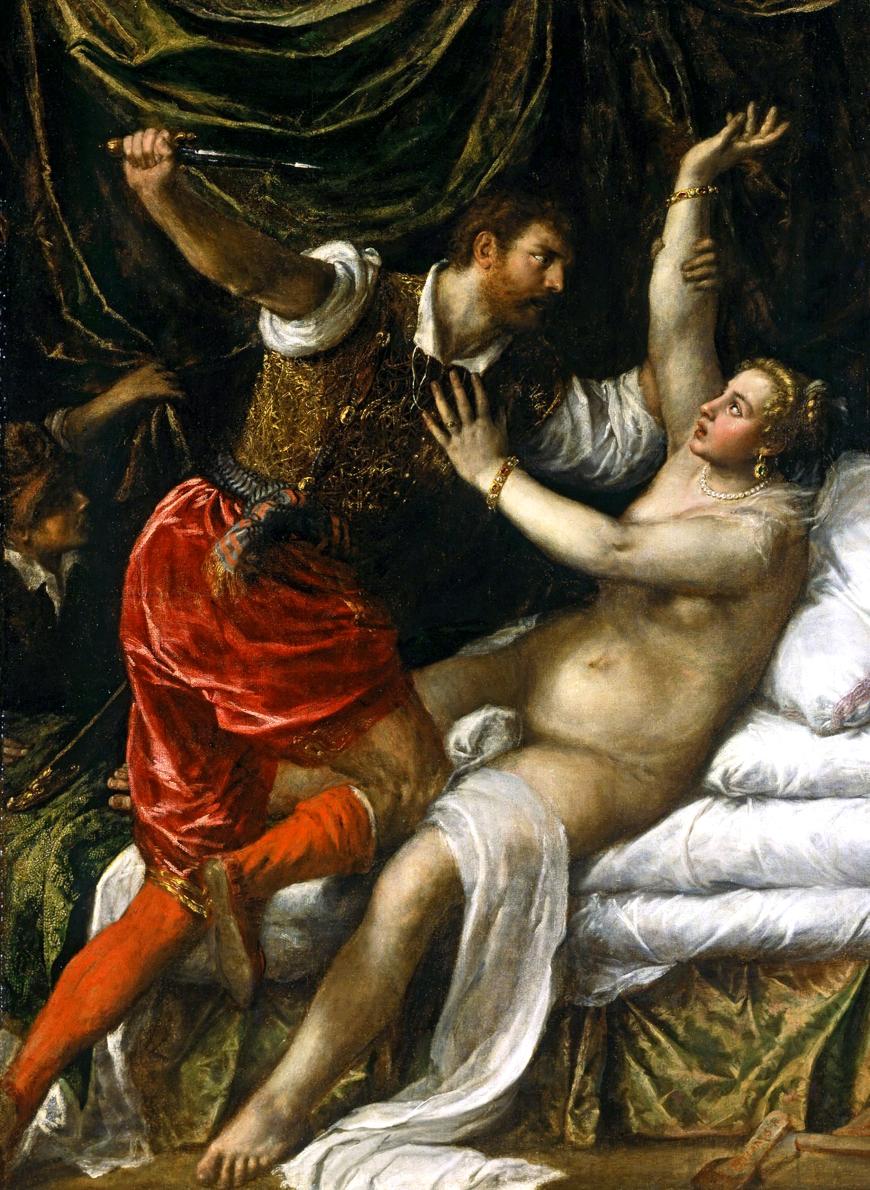
Proving that opera doesn’t need to have the grandiosity of Aida — with elephants, a colossal cast of singers, supernumeraries, dancers, and a large orchestra — Benjamin Britten’s The Rape of Lucretia nevertheless packed as powerful a punch at the Colburn School’s Zipper Hall on Jan. 20, perhaps even more so, considering the subject matter.
Indeed, as presented by Los Angeles Opera, the urgency and in-your-face elements of an octet of singers and a 13-piece LAO ensemble, insightfully led by Resident Conductor Lina González-Granados, gave new meaning to the words intimacy, clarity, and beauty, all wrapped in a damning and brutal storyline.
The Rape of Lucretia, Britten’s first chamber opera and one born out of financial necessity (it was cheaper than standard-size fare), was initially performed at Glyndebourne in 1946. With a libretto by Ronald Duncan (based on André Obey’s play Le Viol de Lucrèce) and to a degree a musing on the ordeal of postwar suffering, this harrowing and disturbing work is, unfortunately, still shockingly relevant today. Here are vicious men dissing women as inebriated whores; soldiers at the ready, emboldened by society, to commit violence on the unsuspecting; and a cabal of cold-blooded politicians leading the charge, as it were.

Yet it’s the music that trumps all, with the experience more than gratifying, validating the power of the highest art form. The singers, mostly culled from LA Opera’s Domingo-Colburn-Stein Young Artist Program (bass-baritone Cedric Berry, here in the role of the duplicitous Junius, though not from the DCS program, has been a constant and fine presence at LAO), gave committed performances confirming that the future of opera is in good hands — and, one might add, in terrific voice.
As to the plot, well, it’s Rome, 500 B.C.E. Although devoid of loose, flowing togas and hand-tooled leather sandals, the cast was well turned out in evening gowns and neo-business suits. By making use of the Male Chorus, here sung by the exceptional tenor Anthony León, first-prize winner of the Operalia competition last October, and the Female Chorus, warm-toned mezzo-soprano Alaysha Fox, the recounting of the despotic rule of Rome by the evil Etruscan prince Tarquinius allowed the audience to be privy to the malicious machinations at work.

And talk about a demonic-in-presence but pure-sounding baritone: Ryan Wolfe (Hugh Jackman-ish in looks, he was seen as the Jailor in this season’s Tosca) oozed smarm and menace in equal proportion, his spot-on delivery a mellifluous revelation. His sociopathic Tarquinius was goaded by the duplicitous Junius (Berry), himself berated as a cuckold.
Indeed, what a narrative it is. The title, which could be the logline for a film, says it all. As we learn from the Choruses, there are debauched drunken escapades, wanton dames, a fervent horseback ride, and the #MeToo plight of the virtuous noblewoman Lucretia. Her bell-like mezzo-soprano a shimmering arrow to the heart, the statuesque Sarah Saturnino still brought power to her moment of powerlessness, weakened and unable as she was to defend herself during that vile scene of macho domination.
That Lucretia is married to the Roman general Collatinus, ably and sonorously sung by Alan Williams, who is unable to prevent the titular rape, gives this story an even sadder touch, one where tyranny wins and, as the libretto says, “all tyrants fall, though tyranny persists.” Shades of America’s current fight for democracy came to mind.
Despite the Christian framing device and moralizing references — and there were several — there is sheer poetry in the libretto: “Death is woman’s final lover”; the “oatmeal slippers of sleep”; “If it were all a dream, then waking would be less a nightmare.” These elegiac words, and many others, provide an exquisite counterpart to Britten’s breathtaking vocal lines and stunning, albeit occasionally feverish, orchestral writing.
And as if to compound the rape, this Roman world painted by Duncan’s libretto bludgeons listeners with overarching darkness. Bragging rights recur, with women constantly objectified — a self-entitled Tarquinius sings of “Sophia’s silver chastity belt … worn by her coachman — as a collar.” The ladies are, of course, kept in their places, with musical respites offering balm for the soul. Mezzo-soprano Madeleine Lyon, as Lucretia’s nurse Bianca, offered solace in her plaintive Act 2 lullaby refrains, and Tiffany Townsend, as the maid Lucia, sang sweetly of roses and orchids.

Unable to live with the thought of having been violated so cruelly and sending word to Collatinus to return, Lucretia — like the heroines in many operas — kills herself. Wrenching on multiple levels, this work is nothing less than a musical extravaganza, notwithstanding the size of the ensemble.
Kudos, then, to the outstanding LAO musicians, who, under the expert baton of González-Granados, also appeared onstage and produced a pristine sound in their mesmeric rendering of a technically demanding and complex score. From JoAnn Turovsky’s delicate and incessantly agitated harp riffs to Jennifer Cullinan’s limpid oboe sounds to William May’s haunting bassoon refrains, this group was on metaphorical fire. This dynamic ensemble proved the perfect accompaniment to a stellar cast of singers whose career prospects would seem to be exceptionally promising.



